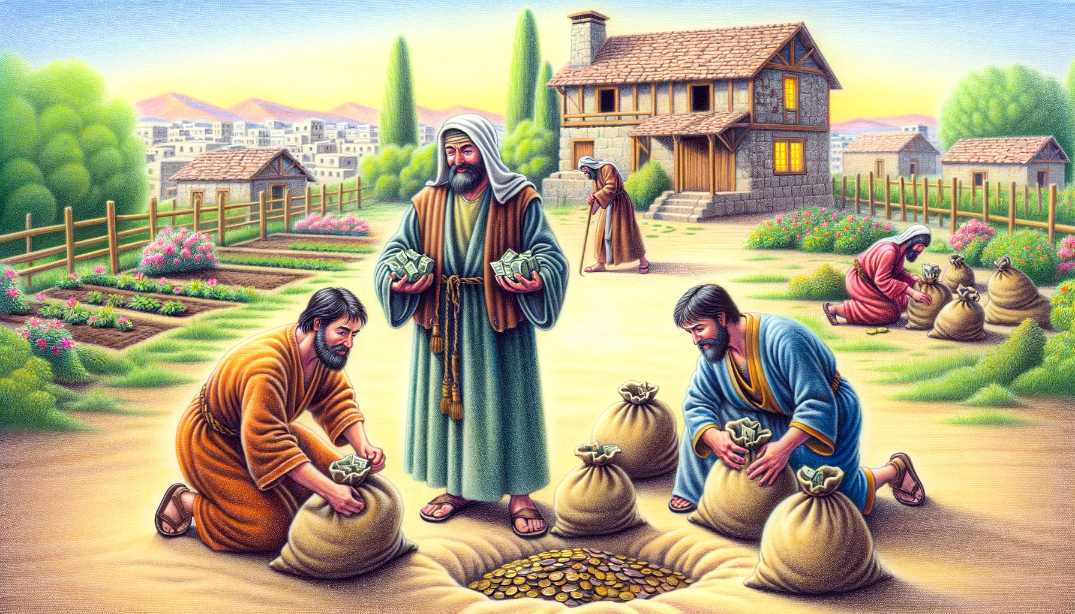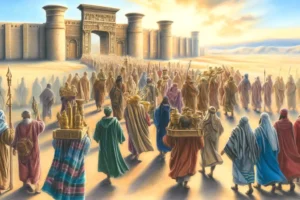
The Parable of the Talents
The Parable of the Talents is one of Jesus’ well-known teachings, found in the Gospel of Matthew. It illustrates the importance of using the gifts and resources God has given us responsibly and faithfully.
Quick Facts
- Biblical Reference: The Parable of the Talents is found in Matthew 25:14-30.
- Setting: Jesus tells this parable as part of His teaching about the Kingdom of Heaven, during the Olivet Discourse.
- Main Characters: A master and his three servants.
- Talents: In this context, a “talent” is a large unit of money.
- Distribution: The master gives different amounts of talents to each servant—five, two, and one—based on their abilities.
- Investment: The servants who received five and two talents invest them and double their amounts.
- Neglect: The servant with one talent buries it in the ground, fearing the master’s reaction.
- Accountability: Upon the master’s return, the servants are called to account for their stewardship.
- Rewards and Consequences: The faithful servants are rewarded, while the unfaithful servant is punished.
- Moral: The parable teaches that God expects us to use our abilities and resources wisely and faithfully for His kingdom.
Summary
The Parable of the Talents, found in Matthew 25:14-30, emphasizes responsible stewardship and the importance of using God-given resources and abilities for the advancement of His kingdom. Through the actions of the master and his servants, Jesus highlights the principles of accountability, reward for faithfulness, and consequences of neglect.
Context and Setting
The Parable of the Talents is located in the Gospel of Matthew, chapter 25, verses 14-30. It is part of Jesus’ Olivet Discourse, where He speaks to His disciples about the end times and the coming of the Kingdom of Heaven. This parable, along with the Parable of the Ten Virgins and the Parable of the Sheep and Goats, is aimed at preparing His followers for His return.
Characters and Structure
- The Master: Represents Jesus Christ, who entrusts His servants with His possessions before going on a journey.
- The Servants: Symbolize believers who are entrusted with various gifts, resources, and responsibilities.
- The Talents: A talent was a significant amount of money in biblical times, symbolizing the vast and varied resources God bestows upon His people.
Distribution of Talents
- Five Talents: Given to the first servant, who uses them to gain five more.
- Two Talents: Given to the second servant, who also doubles the amount.
- One Talent: Given to the third servant, who, out of fear, buries it in the ground and does nothing with it.
Actions and Consequences
- Faithful Servants: The first two servants immediately put their talents to work, demonstrating their willingness to take risks and their dedication to their master’s interests. Their actions reflect trust, diligence, and effective stewardship.
- Unfaithful Servant: The third servant, in contrast, acts out of fear and a misunderstanding of his master’s character. His decision to bury the talent reflects a lack of initiative and a failure to recognize the responsibility he has been given.
Return and Reckoning
Upon the master’s return, he evaluates each servant’s performance:
- Commendation and Reward: The master praises the first two servants, rewarding them with greater responsibilities and inviting them to share in his joy. This illustrates the biblical principle that faithfulness in small things leads to greater opportunities and blessings.
- Rebuke and Punishment: The third servant is rebuked for his laziness and lack of faith. His talent is taken away and given to the servant with ten talents, and he is cast into the outer darkness, symbolizing severe consequences for unfaithfulness and wasted opportunities.
Theological Insights
- Stewardship: The parable underscores the responsibility believers have to manage the gifts and resources God has entrusted to them. This includes spiritual gifts, talents, time, and material resources.
- Accountability: Every believer will be held accountable for how they utilize their God-given resources. This accountability is not based on the quantity of resources but on the faithfulness in using them.
- Risk and Faith: The faithful servants take risks by investing their talents, reflecting a trust in their master and a proactive approach to their stewardship. Faith often involves stepping out and taking risks for the Kingdom of God.
- Judgment and Reward: The parable illustrates the reality of divine judgment and the principle of reward and punishment. Faithful service leads to greater responsibilities and eternal joy, while unfaithfulness results in loss and separation from God.
Practical Applications
- Personal Assessment: Believers are encouraged to assess their own stewardship of the resources God has given them. Are they using their talents, time, and treasures effectively for God’s kingdom?
- Faithfulness in Small Things: The parable teaches that faithfulness in seemingly small tasks is crucial and leads to greater opportunities.
- Overcoming Fear: The third servant’s failure was rooted in fear and a distorted perception of the master. Believers are called to trust in God’s goodness and take bold steps of faith.
Conclusion
The Parable of the Talents is a powerful reminder of the importance of faithful stewardship and the accountability every believer has before God. It challenges Christians to use their God-given resources diligently and wisely, ensuring they are fruitful and prepared for the Master’s return. Through this parable, Jesus calls His followers to be proactive, faithful, and fearless in their service to Him.
Tags
Parable of the Talents, Matthew 25:14-30, Jesus’ teachings, stewardship, Kingdom of Heaven, responsibility, faithfulness, biblical parables, New Testament, divine judgment, accountability, spiritual gifts.



